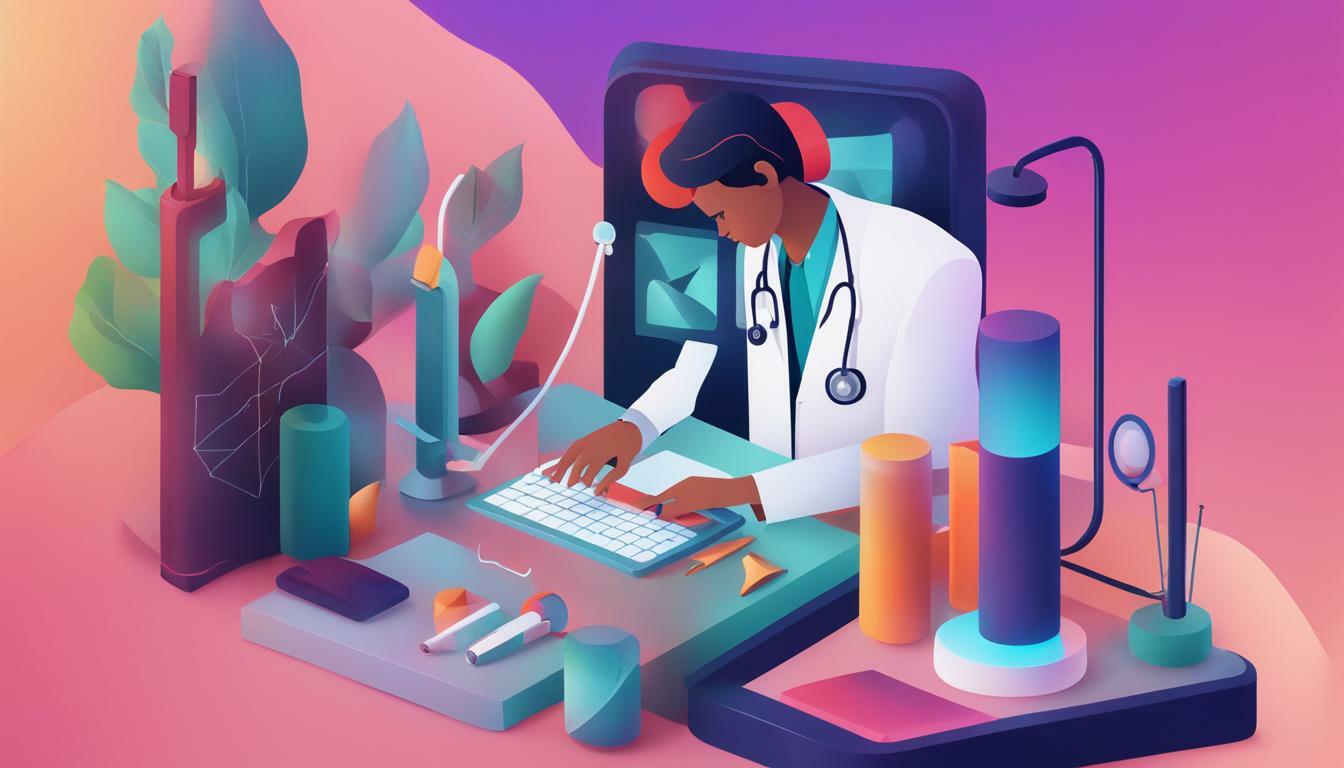Artificial intelligence (AI) is transforming the landscape of mental health diagnosis and treatment, offering unprecedented benefits and advancements in healthcare. With the ability to analyze vast amounts of data and identify patterns, AI technology is revolutionizing the field, and improving mental health care in America.
- AI models such as recurrence, convolution, and transformers play important roles in machine learning and can help identify patterns in data and understand relationships within the input.
- AI in mental health enhances disease diagnosis, aids in treatment selection, improves clinical laboratory testing, and facilitates personalized medicine.
- AI offers increased accuracy, reduced costs, time savings, and minimizes human errors in mental health diagnosis and treatment.
- Challenges include addressing data privacy, potential bias, and the continued need for human expertise in the diagnostic and treatment process.
- AI-assisted mental health treatment can assist in diagnosing diseases, developing personalized treatment plans, and supporting decision-making.
As AI continues to advance, it has the potential to revolutionize mental health treatment further. AI-generated humor, for example, can reduce stress and anxiety, improve mood and outlook, enhance social connectivity, and help individuals cope with challenges. The potential for tailored humor therapies may pave the way for a new era in mental health care. However, it is essential to address challenges such as AI’s understanding of human humor and monotony to fully harness its benefits.
Artificial intelligence in mental health holds great promise, bringing joy and improving mental well-being in various ways. By recognizing and embracing its capabilities, we can unlock its full potential and shape the future of mental health care.
Understanding AI in Mental Health
In order to fully comprehend the benefits of AI in mental health, it is essential to understand the underlying models and concepts that drive its reasoning and development. AI models, such as recurrence, convolution, and transformers, play crucial roles in machine learning and are the building blocks for AI applications in mental health diagnosis and treatment.
Machine learning algorithms enable AI systems to analyze vast amounts of data and identify patterns that may not be immediately apparent to humans. Recurrence models, for example, are designed to process sequential data and capture temporal dependencies, allowing AI to understand the historical context of a patient’s mental health journey.
Convolution models, on the other hand, excel at detecting patterns in structured data, such as brain imaging scans or genetic information. By examining relationships within the input, AI can uncover valuable insights that aid in accurate diagnosis and treatment selection.
Transformers, a relatively new model architecture in AI, are particularly adept at processing unstructured data, such as text or audio. This is especially valuable in mental health, as it allows AI to analyze and understand patients’ spoken or written expressions of their thoughts and emotions, enabling more personalized and targeted interventions.

AI models in mental health harness the power of machine learning to uncover hidden patterns and relationships in the vast amount of data available. By integrating these models into clinical practice, healthcare providers can make better-informed decisions, backed by data-driven insights, to improve patient outcomes.
| AI Model | Main Application |
|---|---|
| Recurrence | Understanding temporal dependencies and patient history |
| Convolution | Detecting patterns in structured data (e.g., brain imaging) |
| Transformers | Processing unstructured data (e.g., text, audio) for personalized interventions |
“Using AI models like recurrence, convolution, and transformers, we can uncover valuable insights that were previously buried in the complexity of mental health data.” – Dr. Amanda Johnson, Mental Health Researcher
As AI continues to advance, these models will only become more sophisticated, enabling healthcare professionals to provide more precise diagnoses, personalized treatment plans, and informed decision-making. However, it is vital to address challenges such as data privacy and ensure that human expertise remains an integral part of the diagnostic and treatment process.
AI Applications in Mental Health Diagnosis and Treatment
AI’s applications in mental health diagnosis and treatment are vast, encompassing disease diagnosis, treatment selection, clinical laboratory testing, and personalized medicine with remarkable accuracy and efficiency. By harnessing the power of AI technology, healthcare providers can revolutionize mental health care and improve patient outcomes.
One of the key advantages of AI in mental health is its ability to enhance disease diagnosis. AI models, such as recurrence, convolution, and transformers, can analyze vast amounts of patient data to identify patterns and relationships. This enables more accurate and timely diagnoses, leading to better treatment outcomes.
In addition to diagnosis, AI can aid in treatment selection by analyzing patient information, medical records, and clinical guidelines. It can process this data quickly and efficiently, providing healthcare providers with evidence-based recommendations for personalized treatment plans. This not only improves patient care but also reduces costs and saves time for both patients and providers.
Clinical laboratory testing is another area where AI has made significant advancements. AI-powered systems can analyze laboratory results and medical images, detecting abnormalities and predicting disease progression. This streamlines the diagnostic process, allowing for earlier intervention and improved patient outcomes.
To summarize, AI has the potential to greatly enhance mental health diagnosis and treatment. Its applications range from disease diagnosis to treatment selection, clinical laboratory testing, and personalized medicine. With increased accuracy, cost reduction, time savings, and minimized human errors, AI is transforming the field of mental healthcare. However, it is important to address challenges such as ensuring data privacy, mitigating bias, and recognizing the importance of human expertise. By leveraging AI’s capabilities and addressing these considerations, we can unlock its full potential and improve mental health care for all.
Challenges and Considerations in AI-Assisted Mental Health Treatment
While AI holds immense potential in mental health treatment, it is crucial to address challenges related to data privacy, potential bias, and the necessity of human expertise in the diagnostic and treatment process. Protecting patient data and maintaining privacy are paramount concerns when utilizing AI technologies in mental healthcare. Ensuring robust data privacy protocols and adhering to strict regulations are necessary to build trust with patients and maintain the integrity of their personal information.
Potential bias in AI algorithms is another area of concern. Biases present in training data can be inadvertently incorporated into AI models, leading to skewed results and potential harm to patients. It is vital to identify and mitigate any biases to ensure fair and equitable treatment for all individuals.
Although AI models have the capability to analyze vast amounts of data and provide valuable insights, human expertise remains essential throughout the diagnostic and treatment process. AI should be seen as a tool to support healthcare professionals rather than replace them. The knowledge, experience, and empathy of healthcare providers are crucial in interpreting AI-generated information, making informed decisions, and delivering personalized treatment plans tailored to individual patients’ needs.
Addressing Challenges for Enhanced Mental Health Care
In order to address these challenges, collaboration between AI developers, healthcare providers, and regulators is essential. Establishing clear guidelines and standards for AI development in mental health care can help ensure transparency, fairness, and safety. Regular audits and assessments of AI systems can be conducted to identify any potential biases and rectify them promptly, ensuring that AI technologies are reliable and unbiased.
Furthermore, integrating AI into existing workflows should be done in a way that empowers healthcare professionals and fosters trust in the technology. Proper training and education on AI technology can equip healthcare providers with the skills necessary to effectively utilize AI tools and interpret their outputs. This collaborative approach can lead to improved diagnosis and treatment outcomes, ultimately benefiting patients and revolutionizing mental health care.
| Key Challenges | Considerations |
|---|---|
| Data Privacy | Implement robust protocols and adhere to regulations to protect patient data. |
| Potential Bias | Identify and mitigate biases in AI algorithms to ensure fair and equitable treatment. |
| Human Expertise | Leverage AI as a tool to support healthcare professionals rather than replace their knowledge and experience. |
Addressing these challenges will pave the way for enhanced mental health care that harnesses the power of AI while safeguarding patient privacy, ensuring fairness, and maintaining the critical role of human expertise. By striking the right balance between AI technology and human involvement, we can create a future where AI-assisted mental health care is truly transformative.

Beyond diagnosis and treatment, AI’s potential to improve mental well-being is illuminated through its ability to generate humor, which serves as a powerful tool in reducing stress, anxiety, and fostering social connectivity.
Humor has long been recognized as a natural remedy for easing tension and promoting a positive mindset. With AI-generated humor, individuals facing mental health challenges can find solace and support in moments of distress. Whether it’s a witty joke, a clever pun, or a funny meme, AI can create content that brings joy and laughter, helping to alleviate the burdens of everyday life.
By reducing stress and anxiety, AI-generated humor contributes to an improved mood and outlook. It provides a welcome distraction from negative thoughts and can help individuals cope with the challenges they face. In times of isolation, humor generated by AI also serves as a bridge, connecting people and enhancing social connectivity. Shared laughter can foster a sense of belonging and strengthen relationships.
As AI continues to advance, its potential to revolutionize mental health treatment through tailored humor therapies becomes apparent. By analyzing data and understanding individual preferences, AI can create customized humor interventions that address specific needs. From personalized jokes to humorous videos, AI-generated content can be tailored to uplift and inspire, bringing a new dimension to mental health care.
However, it is essential to address the challenges that AI faces in understanding human humor and avoiding monotony. As AI technology progresses, researchers and developers must focus on enhancing the algorithms to ensure that the humor generated remains relatable, nuanced, and genuinely funny. This will require ongoing collaboration between AI experts and mental health professionals to refine and improve the effectiveness of AI-generated humor therapies.
In conclusion, AI’s impact on mental well-being goes beyond diagnosis and treatment. Through its ability to generate humor, AI has the potential to reduce stress, anxiety, and improve mood, while fostering social connectivity. Tailored humor therapies have the power to revolutionize mental health care, providing individuals with personalized interventions that bring joy and improve overall well-being. As AI technology continues to evolve, we can expect it to play an increasingly significant role in enhancing mental health support and bringing moments of happiness to those who need it most.
FAQ
Q: What are the benefits of incorporating AI in mental health diagnosis and treatment?
A: AI has the potential to revolutionize mental health diagnosis and treatment, offering increased accuracy, reduced costs, time savings, and minimizing human errors.
Q: How does AI contribute to understanding mental health?
A: AI models such as recurrence, convolution, and transformers play important roles in machine learning. These models can help identify patterns in data and understand relationships between different parts of the input.
Q: What are some of the applications of AI in mental health diagnosis and treatment?
A: AI in healthcare can improve disease diagnosis, treatment selection, clinical laboratory testing, and personalized medicine.
Q: What challenges and considerations are associated with AI-assisted mental health treatment?
A: Challenges include addressing data privacy, bias, and the need for human expertise. However, AI can assist in diagnosing diseases, developing personalized treatment plans, and supporting decision-making.
Q: How does AI-generated humor impact mental well-being?
A: AI-generated humor can reduce stress and anxiety, improve mood and outlook, enhance social connectivity, and help individuals cope with challenges. AI has the potential to tailor humor therapies to individuals’ unique needs and may revolutionize mental health treatment.




